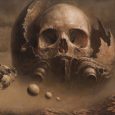|
I'm in for 2015 with 26 books. I could probably do more, but have a penchant for getting excited over dense non-fiction titles that take me an age to read. Case in point: book 1 for 2015 is Doyle's Oxford History of the French Revolution. Its only 500 odd pages, but is pretty dense going (there were apparently a lot of lawyers doing lawyer things during the revolution, its pretty hard to follow sometimes). I'd like to do a bit more in less-read genres for me this year too, I read mainly science fiction and non-fiction. My GR is here, feel free to add me and so on.
|
|
|
|

|
| # ¿ May 21, 2024 03:08 |
|
1. Oxford History of the French Revolution by William Doyle. I chose this one as the revolutionary period is pretty highly contested history (it obviously matters a lot to various political ideologies), and the general sentiment of the book was that it made a fairly good attempt at even-handedness. It was quite dry (a lot of the events of the period centred around law and constitutional reform) punctuated with episodes of extreme violence (the guillotine-ing paled in comparison to the putting down of royalist uprisings in Vendee - 400,000 of a population of 800,000 killed) from just about everyone involved. I had no idea the french actually elected Thomas Paine to the National Convention, he didn't even speak french. I also had no idea there was actually two revolutions in quick succession. Overall it was a good introduction, but a thorough one, so maybe not for casual reading. 2. The Fall by Albert Camus. Maybe this was not the best choice for a first book of Camus' to read (I have The Stranger queued up too), but I really enjoyed this one. It was very short, but had the effect of unfurling in your head after you read it. Strangely religious for an existentialist author, it seemed steeped in metaphors of baptism, confession, and christ. The main character was an unlikeable pompous womaniser (unlikeable on purpose I assume), which made reading the book a bit confrontational. I'm now reading Italo Calvino's If on a winters night a traveller which is awesome and clever and very meta (it starts describing you the Reader reading the book, and just goes off the rails from there). Then some more Camus. I also have a copy of The Brothers Karamazov waiting, but I'm not sure I'm up to it yet, it looks beastly.
|
|
|
|
Siminu posted:
I've read The Dispossessed, which was excellent, and I liked it better than the left hand of darkness. Focusses on the ins and outs of utopian (anarcho-syndicalist) politics rather than gender this time. And also science and how it changes based on the culture it is embedded in. My second book update: 3/26. If on a winter's night a traveller by Italo Calvino. This was a real mind bender. Reading a book about reading the book you are reading, which becomes different books. I guess I took it to be kind of a love-letter to reading books in general, it had some infuriating sections, but was mostly very delightful to read. 4/26.The Stranger by Albert Camus. The second Camus book for this year, I liked it but I read that many readers empathise with the main character, and I really couldn't. I think I could see where Camus was going with it, especially after reading The Fall, which kind of follows through the life philosophy of The Stranger to a conclusion of sorts. I think the other thing that distanced it from me is that Camus (like others in his generation) would have felt more strongly about rejecting christian ethics than we would today, so the existential terror of being "untethered" from the rock of christianity seems a bit overwrought today I think. 5/26. The Warmth Of Other Suns by Isabel Wilkerson. This is a history of black migration from the southern united states to the north from 1915-1970. It was quite a harrowing read, but well worth it. Built out of three people's accounts , with many more as backing evidence, it details the lives of blacks living in the Jim Crow era south and the effective slavery that followed emancipation, the lengths required for these migrants to make their way to the north and west, and their treatment and lives in northern cities. 6/26. Guards Guards! by Terry Pratchett. Decided to read some more Pratchett after news of his death, the few books I've read of his were his first few, so it was nice to see his writing abilities got much better by book 8. A sly satire of politics, and dog breeders. 7/26. The Martian by Andy Weir. Awesome for its technical elements and suspense (which is what I read it for really), clunky in characters. The main character is great as a hero using his engineering and science skills to survive, but kind of childish, maybe the author is a bit of a neckbeard. Still really loved it.
|
|
|



